巴西-英文版介绍
- 格式:ppt
- 大小:16.65 MB
- 文档页数:37
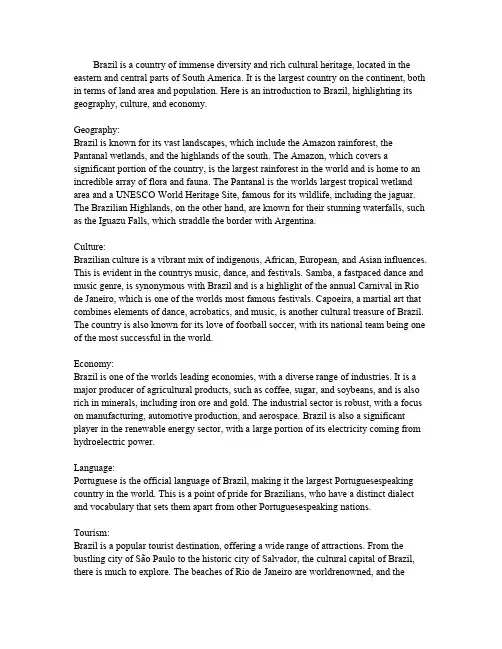
Brazil is a country of immense diversity and rich cultural heritage,located in the eastern and central parts of South America.It is the largest country on the continent,both in terms of land area and population.Here is an introduction to Brazil,highlighting its geography,culture,and economy.Geography:Brazil is known for its vast landscapes,which include the Amazon rainforest,the Pantanal wetlands,and the highlands of the south.The Amazon,which covers a significant portion of the country,is the largest rainforest in the world and is home to an incredible array of flora and fauna.The Pantanal is the worlds largest tropical wetland area and a UNESCO World Heritage Site,famous for its wildlife,including the jaguar. The Brazilian Highlands,on the other hand,are known for their stunning waterfalls,such as the Iguazu Falls,which straddle the border with Argentina.Culture:Brazilian culture is a vibrant mix of indigenous,African,European,and Asian influences. This is evident in the countrys music,dance,and festivals.Samba,a fastpaced dance and music genre,is synonymous with Brazil and is a highlight of the annual Carnival in Rio de Janeiro,which is one of the worlds most famous festivals.Capoeira,a martial art that combines elements of dance,acrobatics,and music,is another cultural treasure of Brazil. The country is also known for its love of football soccer,with its national team being one of the most successful in the world.Economy:Brazil is one of the worlds leading economies,with a diverse range of industries.It is a major producer of agricultural products,such as coffee,sugar,and soybeans,and is also rich in minerals,including iron ore and gold.The industrial sector is robust,with a focus on manufacturing,automotive production,and aerospace.Brazil is also a significant player in the renewable energy sector,with a large portion of its electricity coming from hydroelectric power.Language:Portuguese is the official language of Brazil,making it the largest Portuguesespeaking country in the world.This is a point of pride for Brazilians,who have a distinct dialect and vocabulary that sets them apart from other Portuguesespeaking nations. Tourism:Brazil is a popular tourist destination,offering a wide range of attractions.From the bustling city of São Paulo to the historic city of Salvador,the cultural capital of Brazil, there is much to explore.The beaches of Rio de Janeiro are worldrenowned,and thecountrys national parks,such as the Fernando de Noronha archipelago,offer pristine natural beauty.In conclusion,Brazil is a country of contrasts and a land of opportunity.Its rich history, diverse culture,and natural beauty make it a fascinating place to visit and learn about. Whether youre interested in exploring the Amazon,experiencing the thrill of a football match,or simply enjoying the warmth of the Brazilian people,there is something for everyone in this South American giant.。
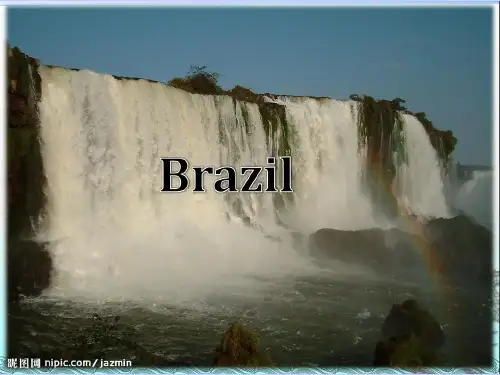
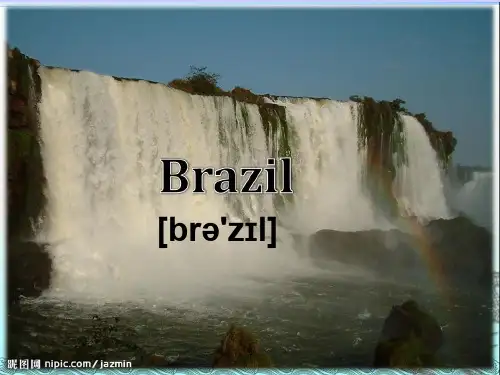
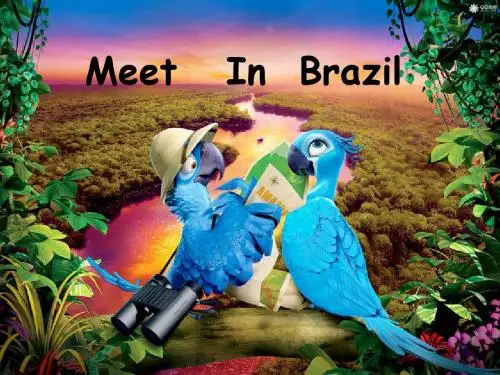
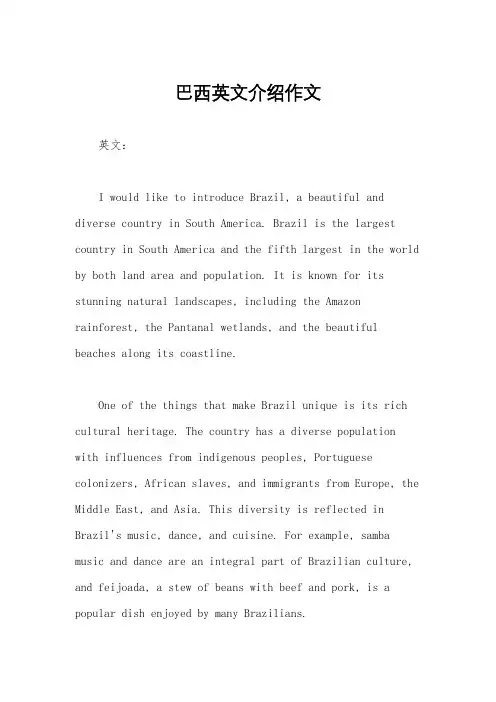
巴西英文介绍作文英文:I would like to introduce Brazil, a beautiful and diverse country in South America. Brazil is the largest country in South America and the fifth largest in the world by both land area and population. It is known for its stunning natural landscapes, including the Amazon rainforest, the Pantanal wetlands, and the beautiful beaches along its coastline.One of the things that make Brazil unique is its rich cultural heritage. The country has a diverse population with influences from indigenous peoples, Portuguese colonizers, African slaves, and immigrants from Europe, the Middle East, and Asia. This diversity is reflected inBrazil's music, dance, and cuisine. For example, samba music and dance are an integral part of Brazilian culture, and feijoada, a stew of beans with beef and pork, is a popular dish enjoyed by many Brazilians.In addition to its natural beauty and cultural richness, Brazil is also known for its vibrant and lively festivals. One of the most famous is the Carnival in Rio de Janeiro, which is a massive celebration with parades, music, and dancing. It is a time when people from all walks of life come together to celebrate and have a good time.Another aspect of Brazil that I find fascinating is its soccer culture. Brazilians are passionate about soccer, and the country has produced some of the greatest players inthe world, such as Pelé, Ronaldo, and Ronaldinho. Socceris not just a sport in Brazil, it is a way of life, and the passion and energy of Brazilian soccer fans is truly something to behold.Overall, Brazil is a country with a lot to offer, from its natural beauty and cultural diversity to its lively festivals and passionate soccer culture. It is a placewhere you can experience the best of both the natural and cultural worlds.中文:我想介绍一下巴西,这是南美洲一个美丽而多样化的国家。
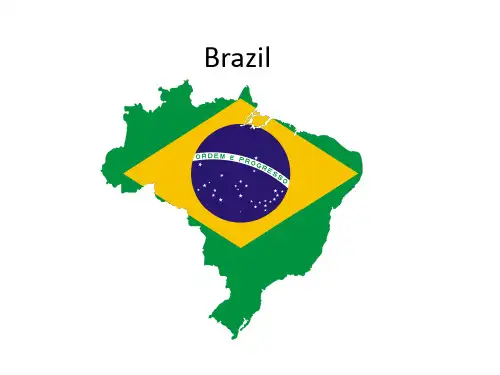
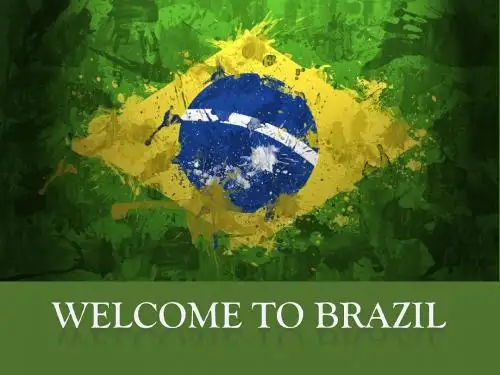
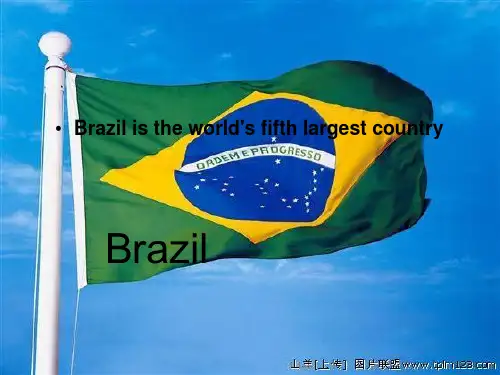
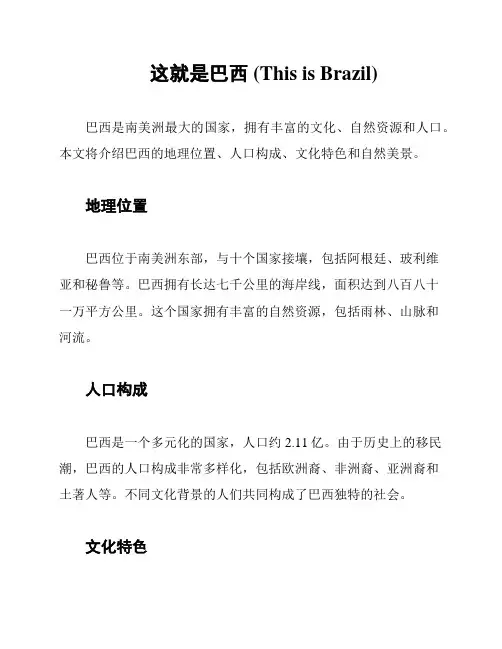
这就是巴西 (This is Brazil)
巴西是南美洲最大的国家,拥有丰富的文化、自然资源和人口。
本文将介绍巴西的地理位置、人口构成、文化特色和自然美景。
地理位置
巴西位于南美洲东部,与十个国家接壤,包括阿根廷、玻利维
亚和秘鲁等。
巴西拥有长达七千公里的海岸线,面积达到八百八十
一万平方公里。
这个国家拥有丰富的自然资源,包括雨林、山脉和
河流。
人口构成
巴西是一个多元化的国家,人口约2.11亿。
由于历史上的移民潮,巴西的人口构成非常多样化,包括欧洲裔、非洲裔、亚洲裔和
土著人等。
不同文化背景的人们共同构成了巴西独特的社会。
文化特色
巴西是世界著名的文化强国,享有“舞蹈的国家”、“足球的国家”之称。
巴西音乐和舞蹈风靡全球,其中最有名的就是桑巴和博
萨诺瓦。
此外,巴西的美食也非常有特色,如烤肉和法茹达。
自然美景
巴西拥有许多壮丽的自然景点,其中最著名的就是亚马逊雨林。
亚马逊雨林是世界上最大的热带雨林,以其丰富的生物多样性和壮
丽的自然景观而闻名。
巴西还有伊瓜苏瀑布、皮库瓜国家公园等令
人叹为观止的自然奇观。
巴西是一个多元化而有魅力的国家,拥有丰富的文化和自然资源。
这个文章只是对巴西的简要介绍,真正了解巴西还需要亲自去
体验和探索。
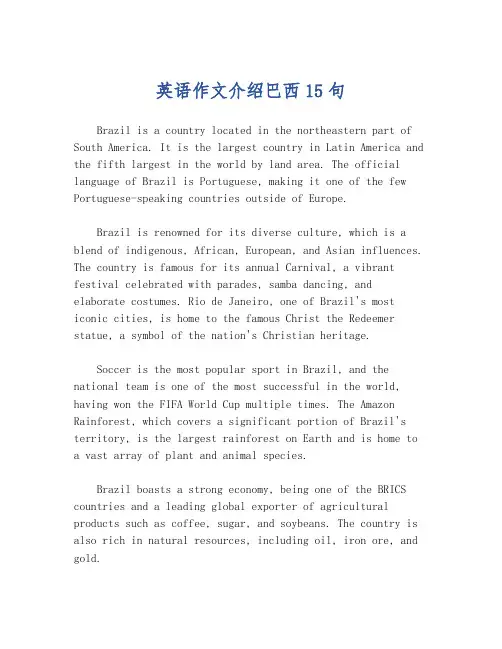
英语作文介绍巴西15句Brazil is a country located in the northeastern part of South America. It is the largest country in Latin America and the fifth largest in the world by land area. The official language of Brazil is Portuguese, making it one of the few Portuguese-speaking countries outside of Europe.Brazil is renowned for its diverse culture, which is a blend of indigenous, African, European, and Asian influences. The country is famous for its annual Carnival, a vibrant festival celebrated with parades, samba dancing, and elaborate costumes. Rio de Janeiro, one of Brazil's most iconic cities, is home to the famous Christ the Redeemer statue, a symbol of the nation's Christian heritage.Soccer is the most popular sport in Brazil, and the national team is one of the most successful in the world, having won the FIFA World Cup multiple times. The Amazon Rainforest, which covers a significant portion of Brazil's territory, is the largest rainforest on Earth and is home to a vast array of plant and animal species.Brazil boasts a strong economy, being one of the BRICS countries and a leading global exporter of agricultural products such as coffee, sugar, and soybeans. The country is also rich in natural resources, including oil, iron ore, and gold.In addition to its natural beauty and cultural richness, Brazil faces challenges such as deforestation, urban poverty, and political instability. However, the country continues to strive for sustainable development and social progress.Brazil's cuisine is as diverse as its people, with dishes like feijoada, a traditional black bean stew, and churrasco, a type of barbecued meat, being popular throughout the country. The Brazilian people are known for their warm hospitality and love for music and dance.The Pantanal, another significant biome in Brazil, is one of the world's largest tropical wetland areas and a haven for wildlife enthusiasts. The country's coastline stretches over 7,000 kilometers, offering beautiful beaches andopportunities for water sports.Education is highly valued in Brazil, with a growing number of universities and research institutions contributing to the country's scientific and technological advancements. The Brazilian people are proud of their history and are always eager to share their culture with visitors.Brazil's climate varies from tropical in the north to temperate in the south, providing a wide range of landscapes from lush rainforests to arid deserts. The country's biodiversity is a testament to its rich natural heritage.In conclusion, Brazil is a country of contrasts, offering a unique blend of natural beauty, cultural diversity, and economic potential. Its people, landscapes, and traditionsmake it a fascinating destination for travelers and a vibrant nation with a bright future.。
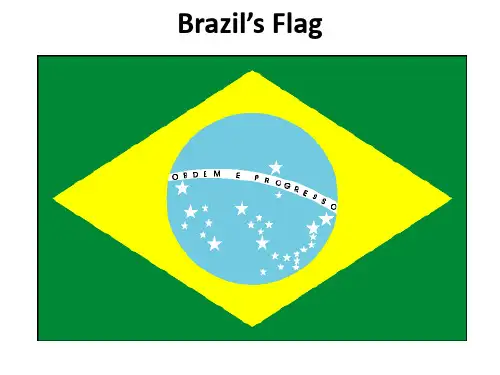
描述巴西英文作文英文:Brazil is a country full of diversity and natural beauty. From the beaches of Rio de Janeiro to the Amazon rainforest, there is something for everyone in Brazil. The people are friendly and welcoming, and the culture is vibrant and colorful.One of my favorite things about Brazil is the food. The cuisine is a mix of African, European, and indigenous influences, resulting in a unique and delicious blend of flavors. Some popular dishes include feijoada, a black bean stew with meat and vegetables, and churrasco, a type of barbecue.Another aspect of Brazilian culture that I love is the music. Samba and bossa nova are two popular genres, and you can hear them being played everywhere from bars to street corners. The music is infectious and always puts me in agood mood.Overall, Brazil is a wonderful country to visit and experience. Whether you're looking for beautiful scenery, delicious food, or lively culture, Brazil has it all.中文:巴西是一个充满多样性和自然美景的国家。
介绍巴西英语作文Brazil, the largest country in South America, is a land of diverse cultures, vibrant festivals, and a rich history. This essay aims to provide an overview of Brazil, touching uponits geography, people, language, and some of the unique aspects that make it a fascinating country to explore.Geography and Climate:Brazil is located in the eastern and southern hemispheres, with a coastline that stretches over 7,400 kilometers along the Atlantic Ocean. It shares borders with several countries, including Argentina, Bolivia, and Peru. The country's diverse geography includes the Amazon rainforest, the Pantanal wetlands, the Cerrado savannah, and the peaks of the Serra do Mar. The climate varies from tropical in the north to temperate in the south, with the Amazon region experiencing high humidity and rainfall throughout the year.People and Culture:With a population of over 210 million people, Brazil is the sixth most populous country in the world. It is a melting pot of cultures, primarily due to its history of indigenous habitation, European colonization, and African slavery. This blend of cultures is evident in the country's music, dance, and cuisine. Brazilians are known for their warmth and friendliness, and they are passionate about their national sport, football (soccer).Language:The official language of Brazil is Portuguese, which was brought to the country by Portuguese settlers in the 16th century. It is the only country in South America that does not speak Spanish. Brazilian Portuguese has its own unique pronunciation, vocabulary, and expressions, which can differ significantly from European Portuguese.Festivals and Traditions:Brazil is famous for its lively festivals, the most notable being the Carnival, which is considered the largest street party in the world. The Carnival takes place in the days leading up to Lent and features colorful parades, samba dancing, and elaborate costumes. Another significant event is the Rio de Janeiro New Year's Eve celebration, where millions gather on Copacabana Beach to watch fireworks and offer their wishes to the Yemanja, the goddess of the sea.Economy and Development:Brazil has the twelfth largest economy in the world and is a member of the BRICS group, which includes emerging market countries. It is a leading producer of agricultural commodities such as coffee, sugar, and beef, and it has a growing industrial sector. The country has made significant strides in reducing poverty and improving education and healthcare for its citizens.Conservation and Challenges:Despite its progress, Brazil faces challenges in environmental conservation, particularly in the Amazon rainforest, which is crucial for the global climate.Deforestation, illegal mining, and agricultural expansion are threats to this ecosystem. The country is working on sustainable development initiatives and has implemented policies to protect its natural resources.In conclusion, Brazil is a country of contrasts and a vibrant tapestry of experiences. From its bustling cities to its pristine natural landscapes, it offers a rich cultural heritage and a glimpse into a diverse and dynamic society. Whether you are interested in its natural wonders, cultural celebrations, or economic potential, Brazil is a country that invites exploration and discovery.。
关于巴西的英语资料以下是一些关于巴西的英语资料:1.Geography: Brazil is the largest country in South America,occupying about half of the continent's land area. It has a diverse geography, including the Amazon Rainforest, the BrazilianHighlands, and a long coastline along the Atlantic Ocean.2.Population: With a population of over 210 million people, Brazil isthe most populous country in South America and the sixth most populous country in the world.3.Economy: Brazil has a large and diverse economy, being one ofthe largest emerging economies in the world. It is known for its agricultural production, especially coffee, soybeans, andsugarcane, as well as its significant industrial and service sectors.4.Culture: Brazilian culture is a blend of Indigenous, African, andEuropean influences. It is famous for its music, dance, cuisine, and festivals, such as the Carnival in Rio de Janeiro.5.Sport: Brazil is renowned for its passion for sports, particularlyfootball (soccer). The country has produced many legendaryfootball players and has won the World Cup five times.6.Natural Resources: Brazil is rich in natural resources, including vastforests, water resources, and mineral deposits. It is a majorexporter of commodities such as iron ore, oil, and agriculturalproducts.7.Biodiversity: Due to its extensive Amazon Rainforest, Brazil ishome to a significant portion of the world's biodiversity. Therainforest is a crucial ecosystem for the planet and is subject to conservation efforts.8.These are just some of the aspects that make Brazil a unique andfascinating country. Please note that this information is a general overview, and there is much more to discover about Brazil'shistory, culture, and society.。
巴西的英语知识点总结Geography of BrazilBrazil is located in the eastern part of South America and covers nearly half of the continent's land area. It shares borders with all South American countries except for Chile and Ecuador. The country has a vast and varied geography, with the Amazon Rainforest in the north, the expansive central plateau, and the coastal areas in the east and south.The Amazon Rainforest is the largest tropical rainforest in the world, covering most of the north of Brazil. It is home to an incredibly diverse range of plant and animal species and is vital for the world's climate. The Amazon River, which flows through the rainforest, is the second-longest river in the world.In the central plateau region, the landscape is more arid, with savannas and grasslands dominating the area. The famous Pantanal wetlands, one of the world's largest tropical wetland areas, are located in this region, providing a unique habitat for numerous species of wildlife.The eastern and southeastern regions of Brazil are known for their beautiful coastline, with popular beach destinations such as Rio de Janeiro and Salvador attracting tourists from around the world. The landscape in this area is characterized by tropical forests, rolling hills, and expansive beaches.History of BrazilThe history of Brazil is a complex and fascinating story that spans thousands of years. Before the arrival of Europeans, the region was inhabited by indigenous peoples who had established complex societies and cultures. The Portuguese were the first Europeans to arrive in Brazil in 1500, and they quickly established colonies along the coast, primarily for the extraction of valuable resources such as sugar and gold.The exploitation of indigenous peoples and the importation of African slaves to work on plantations led to the establishment of a diverse and multicultural society in Brazil. In 1822, Brazil declared its independence from Portugal and became a monarchy, with Dom Pedro I as its first emperor. The country abolished slavery in 1888, becoming one of the last countries in the Western Hemisphere to do so.In the 20th century, Brazil experienced periods of political and economic turmoil, including military dictatorships and social unrest. In 1985, Brazil returned to democratic rule, and the country has since become one of the world's leading emerging economies.Culture and Society in BrazilBrazil is renowned for its vibrant and diverse culture, which is a product of its indigenous, European, African, and Asian influences. The country's cultural identity is shaped by its music, dance, cuisine, and religious practices.Music and dance play a central role in Brazilian culture, with genres such as samba, bossa nova, and forró captivating audiences worldwide. The annual Carnival festival, held in cities such as Rio de Janeiro and Salvador, is a flamboyant celebration of music, dance, and pageantry that attracts millions of visitors every year.Brazilian cuisine is a fusion of flavors and influences from around the world. Traditional dishes such as feijoada, a hearty black bean stew, and churrasco, a barbecued meat feast, are beloved by locals and tourists alike. The country is also famous for its coffee production, with Brazil being the world's largest exporter of coffee beans.Religion plays an important role in Brazilian society, with the majority of the population identifying as Roman Catholic. However, there is also a significant presence of Protestant, Spiritist, and Afro-Brazilian religions, reflecting the country's multicultural heritage.Economic and Social Development in BrazilBrazil is one of the world's leading emerging economies, with a diverse and dynamic economic base. The country is a major exporter of commodities such as soybeans, iron ore, and petroleum, and has a growing industrial sector that produces automobiles, aircraft, and consumer goods.Despite its economic potential, Brazil faces significant social and economic challenges, including high levels of inequality, poverty, and crime. The country has made progress in addressing these issues, with initiatives to improve access to education, healthcare, and social services for disadvantaged communities.Environmental Sustainability in BrazilAs home to the Amazon Rainforest and other diverse ecosystems, Brazil plays a vital role in global efforts to preserve the environment and combat climate change. The country has made significant commitments to conservation and sustainability, including efforts to reduce deforestation and promote renewable energy sources.The preservation of the Amazon Rainforest is a critical priority for Brazil, as it is an essential carbon sink and a vital source of biodiversity. The country has established a network of national parks and protected areas, as well as conservation programs that engage local communities in sustainable land use practices.Brazil's English EducationEnglish education in Brazil has been growing rapidly in recent years, with a growing demand for English language skills in the global economy. Many public and private schools offer English classes as part of their curriculum, and there is a growing number of language schools and institutes that provide English language training.English language proficiency is highly valued in Brazil, especially in business, tourism, and international relations. As a result, many Brazilians seek to improve their English skills through formal education, private tutoring, and online language learning resources.In conclusion, Brazil is a diverse and dynamic country with a rich cultural heritage, a vibrant economy, and a critical role in global environmental sustainability. By understanding key English knowledge points related to Brazil, including its geography, history, culture, and educational landscape, individuals can gain a deeper appreciation of this fascinating and influential nation.。